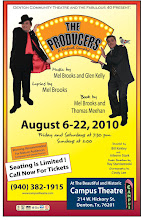A friend of mine (a music director, no less) recently pointed me towards this article, which he discovered via a tweet from @backstagejobs on Twitter:
http://theatrelawyer.com/2009/07/10/producers-beware-theatregoer-sues-over-canned-music-and-wins/
Now, while I'm not sure that legal action was necessary, it did prove the disgruntled theatre-goer's point in a big way and got people talking about it.
In this current economic climate, theatres are suffering. Budget cuts have to be made and, in some of the worst cases, theatres are having to close their doors (North Shore Music Theatre in Beverly, MA, was one of the closings that really made me sad). While we'd all like to think that these theatres (especially the non-profits) exist solely to promote the arts in our areas, the fact remains that, "at the end of the day," they are still businesses. And any business requires money management and a bottom line that remains in the black. It makes perfect, logical sense.
However, why should only the musicals suffer, while the stage plays get to keep all of the artistic integrity of their productions?
Should theatres try to find all-volunteer orchestras? I know for a fact that in an arts-heavy area such as the Dallas/Ft. Worth region, you're going to be hard-pressed to find musicians who will work for free when there is usually another paying gig they could accept instead.
Some publishing houses, such as Music Theatre International (MTI) for one, will offer electronic musical resources such as OrchEXTRA to supplement (read: not replace) a smaller orchestra -- but these resources are not free. They are paid for and licensed along with the rest of the materials needed to produce a show. I can't be sure on whether or not paying for these resources would actually save any money -- it would ultimately depend on the show and the orchestration required to perform the show as intended by the composers (and, ahem, the license).
What do you think? Is canned music here to stay, at least given the current economic situation in which we find ourselves?
Are you a musician? An actor? A director? A budget manager of a theatre? What do you think of this?
Monday, July 13, 2009
Monday, July 6, 2009
Brain Overload!
 So, fellow actors and performers...I'm sure you've all been here before during the preparation of a role:
So, fellow actors and performers...I'm sure you've all been here before during the preparation of a role:BRAIN OVERLOAD!
It's a loosely defined term, tending to have different meanings and arrive at various stages of the process for each individual, but the general concept is the same.
It is the point in the preparation in which the performer's brain becomes saturated with lines, lyric, staging and choreography. Which lyric comes next? Do I cross downstage on his line or mine? Or was I supposed to cross upstage?
The level of Brain Overload is also directly related to the size and scope of a role being learned, I've found, and this is arbitrary depending upon the performer and the role. Sometimes, a larger role is much easier to learn than a walk-on cameo or featured role. It's all relative.
Ladies and gentlemen, I'm reaching that point with my current role (see sidebar).
I think it is possibly more difficult for those of us who are performers "on the side" or as a hobby -- something extracurricular when we leave our day jobs. It's sometimes tough to compartmentalize all of the "theatre information" into a tickler file in your brain -- managing to keep it organized and all in there, yet still accessible whenever we need it. Though I can only imagine it's equally difficult for the professional performers, who are likely always working on more than one project at a time.
So, I'm curious. How do you handle Brain Overload? What are your tried and true methods of learning your lines and lyrics and making them "stick?" Do you just read them over and over? Do you write/type them out? Do you record them on a recorder/Mp3 player? What has worked and what has not worked for you?
I'm also curious to know which roles were the most difficult for you personally. Enlighten me!
Subscribe to:
Posts (Atom)

















